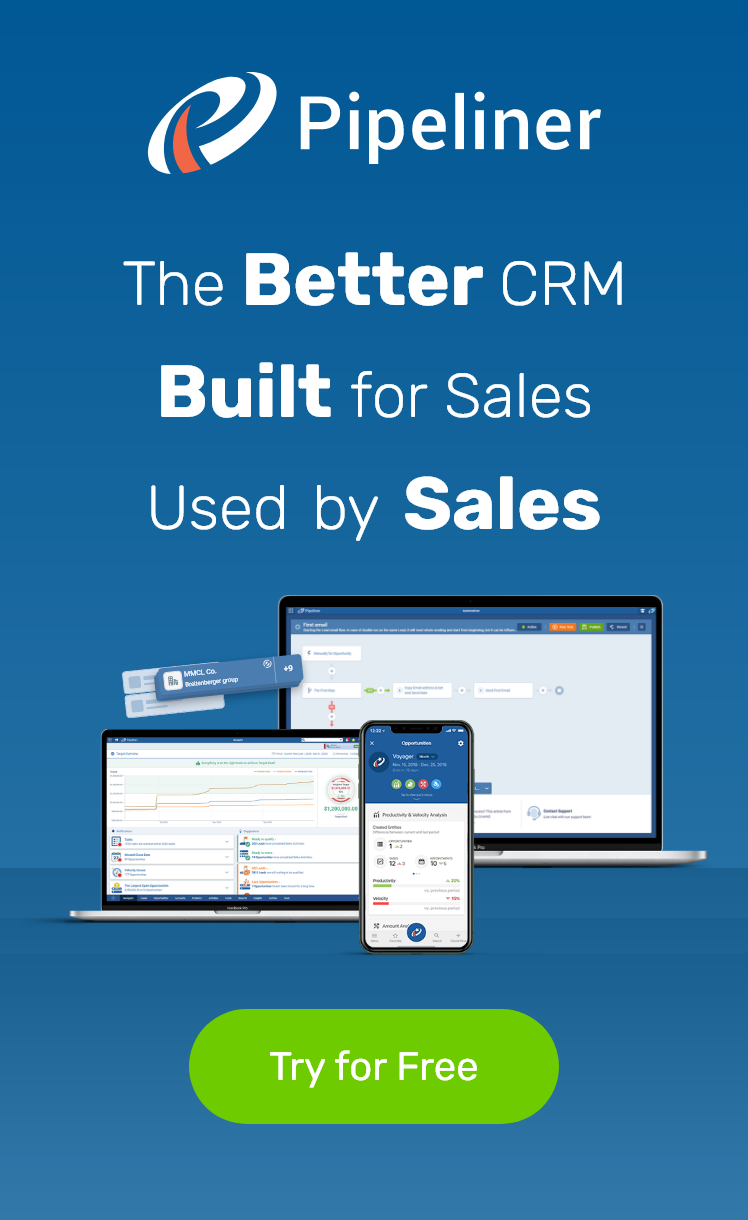
His company has developed patented research methods that provide accurate measurements of how customers think and behave. Their clients include blue-chip companies such as ARAMARK, Coors, General Motors, Rockwell Automation, Sabre and Sikorsky Aircraft.
Miller is co-founder of Miller-Heiman.
Win With Conceptual Selling—and Pipeliner CRM
Conceptual Selling is a broadly applied selling methodology developed by Robert B. Miller and Stephen E. Heiman. Instead of dealing specifically with selling a productProduct Product refers to anything (an idea, item, service, process or information) that meets a need or a desire and is offered to a market, usually but not always at a price., it deals with the prospect’s concept of a product or service and relating it to the prospect’s issues.
Conceptual Selling has been the topic of two bestselling books: Conceptual Selling (1989) and The New Conceptual Selling (2005). It is highly recommended you read one or both of these books to gain a full understanding of Conceptual Selling.
Listening
The Conceptual Selling methodology places considerable emphasis on listening. In the old days, salespeople mainly learned to talk, not to listen—it was about that all-important pitch and how well it “got over.”
In Conceptual Selling, the salesperson begins by listening to the prospect in order to fully understand the prospect’s concept of their problems and issues. The salesperson then relates the product or service directly to that concept.
Reasons to Buy
Why is listening such a critical component of Conceptual Selling? Because the prospect’s concept of the issues their company are facing translate to reasons to buy your product or service.
This can require some “unlearning” on the part of salespeople steeped in glibly listing out the benefits as they understand them. The point is that, of course, their understanding of benefits isn’t what counts: it’s the prospect’s understanding that means everything.
Asking Questions
Of course, the salesperson is never going to obtain this information without asking the right questions. Hence Conceptual Selling is designed around asking intelligent questions.
The questions fall into three stages: getting information, giving information, and getting a commitment.
Additionally, the questions fall into five categories:
- Confirmation questions reaffirm information.
- New information questions clarify the prospect’s concept of the product or service and explore what they’d like to achieve.
- Attitude questions seek to understand a prospect on a personal level and discover their connection to the project.
- Commitment questions inquire after a prospect’s investment in the project.
- Basic issue questions raise potential problems.
One vital component emphasized in Conceptual Selling is that the sale must be a win-win—for both the salesperson and the buyerBuyer A buyer is an individual or organizational entity that purchases a product or subscribes to a service.. If it isn’t, the salesperson should walk away.
The Backbone: An Efficient CRM SolutionSolution Solution is a combination of ideas, strategies, processes, technologies and services that effectively helps an organization achieve its goals or hurdle its challenges.
Conceptual Selling will only truly succeed with a highly efficient CRM solution.
- The concepts given you by the prospect of their issues must be exactly recorded in such a way that they can be instantly retrieved.
- The stages of Conceptual Selling questions—getting information, giving information, and getting commitment—will parallel the stages of a company’s sales processSales Process Sales Process is a series of strategic steps or a set of activities aimed at driving sales growth through the alignment of personnel, market insight, methodologies, relevant business units, and technology.. Your CRM solution should exactly mirror your sales process so the answers fall into the same places, every time.
- Your sales process stages should be mapped out as precisely as possible, with the Conceptual Selling questions that should be asked in each stage, the answers that need to be obtained in each stage, and the buyer and seller actions laid out that will result in the sale moving to the next stage.
With its completely visual, intuitive functionality, Pipeliner CRM meets and exceeds these qualifications and more.
Find out how Pipeliner CRM can totally empower your Conceptual Selling efforts. Try our free trial.
Conceptual Selling is a registered trademark of MHI.

